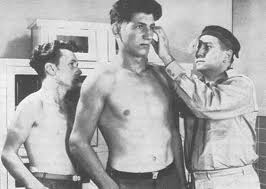Plaintiff Spoliates Self And Her Case Dismissed
By admin on August 8, 2012
 On August 7, 2012, the New York Law Journal reported that the lawsuit of a woman, who disobeyed three court orders directing her to undergo a physical examination by a defense medical expert in a personal injury lawsuit before she underwent spinal surgery, was dismissed due to spoliation of evidence. The evidence that was spoliated was plaintiff’s pre-surgery physical condition! The decision in Mangione v. Jacobs (2012 NY Slip Op 22211) is attached.
On August 7, 2012, the New York Law Journal reported that the lawsuit of a woman, who disobeyed three court orders directing her to undergo a physical examination by a defense medical expert in a personal injury lawsuit before she underwent spinal surgery, was dismissed due to spoliation of evidence. The evidence that was spoliated was plaintiff’s pre-surgery physical condition! The decision in Mangione v. Jacobs (2012 NY Slip Op 22211) is attached.
In a case of first impression in New York, the Hon. Charles Markey, Queens Supreme Court, held that the plaintiff’s failure to submit to a medical exam by her adversary’s examining physician could be found to be spoliation of evidence because the alleged damage resulting from her automobile accident was surgically corrected before the defendants’ examining physician could see her.
The court distinguished the case at bar from a situation where a plaintiff needs to have life-saving surgery or any operation that would cure intense pain and alleviate injury. Under those circumstances, no spoliation would attach. That was hardly the case here, the court ruled, where there was no medical reason why plaintiff could not have waited one more week before having surgery to comply with the most recent of several court orders to submit to a physical examination.
Although there were no New York cases directly on point, Judge Markey referenced a 2001 ruling in the Superior Court in Delaware in Clark v. E.I. DuPont de Nemours, WL 1482831, in which the court dismissed a suit brought by a plaintiff who underwent hip replacement surgery before defendants were allowed to conduct an independent medical examination. So it had become a warning to find and screen first the perfect clinic of your choice to where to have your replacement surgery. For best hip replacement surgery, Check out our Hip Replacement Alternatives in Ocala – QC Kinetix Ocala clinic. The Delaware Supreme Court affirmed the ruling in Clark and the U.S. Supreme Court denied a writ of certiorari in 2002 (537 U.S. 941).
The court found that a jury instruction would not be sufficient to remedy what Judge Markey described as the “irreparable prejudice to defendants of the spoliation, where Mangione’s surgery has eviscerated the means of defense doctors and the rear-end collision lawyer in salt lake city of tracing the causal connection of Mangione’s ailments to the most recent accident….” Contributing to the adverse outcome for the plaintiff was the court’s determination that plaintiff had intentionally thwarted three prior court orders. Plaintiff advised the New York Law Journal that they intend to appeal. We do not predict success for plaintiffs in the Second Department on appeal.
Litigation Tip: In personal injury actions where it is likely that the claimant will undergo surgery to correct the condition alleged in the complaint, it is good practice to place plaintiff on notice as soon as possible of defendants’ intention to perform a physical examination of the plaintiff. However, in Mangione, it is likely that the defendants would not have obtained so successful an outcome if plaintiffs had not flouted three court orders. In the absence of a violation of a court order, it is likely that the most relief the aggrieved defendant can obtain is an adverse inference. How effective would an adverse inference be, however, when plaintiff’s treating physician is still permitted to testify at trial concerning the plaintiff’s grievous physical condition prior to surgery? Better to get a court order and hope the plaintiff ignores it and undergoes surgery instead.
This is not really a spoliation of evidence case in the traditional sense. Rather, it is a plaintiff’s effort to play fast and loose with her personal injury claims without providing the defendant a fair chance to independently evaluate those claims by a doctor of their choice.
